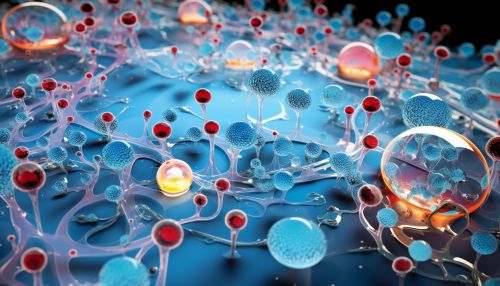Metabolic water
Introduction
Metabolic water refers to the water produced inside a living organism through their metabolic processes. It is a crucial component of the water cycle within an organism's body. Metabolic water is produced during the process of cellular respiration, where it is a byproduct of the oxidation of nutrients.


Metabolic Processes and Production of Water
The production of metabolic water occurs during the process of cellular respiration, specifically during the oxidative phosphorylation stage. This stage involves the transfer of electrons from NADH or FADH2 to oxygen by a group of protein complexes in the mitochondria known as the electron transport chain. During this process, water is produced as a byproduct.
The equation for the complete oxidation of glucose can be represented as:
C6H12O6 (glucose) + 6O2 (oxygen) → 6CO2 (carbon dioxide) + 6H2O (water)
This equation shows that for every molecule of glucose oxidized, six molecules of water are produced. This water is known as metabolic water.
Importance of Metabolic Water
Metabolic water plays a crucial role in the survival of many organisms, especially those living in arid environments where external sources of water are scarce. For example, the kangaroo rat and certain species of camels and desert beetles rely heavily on metabolic water for their survival. These animals have evolved metabolic processes that maximize the production of metabolic water while minimizing water loss through excretion and evaporation.
Metabolic Water in Humans
In humans, metabolic water contributes to about 10% of the body's total water requirements. However, this percentage can increase during periods of fasting or starvation, as the body begins to metabolize stored fats and proteins, leading to an increased production of metabolic water.
Metabolic Water in Other Organisms
Insects, birds, and certain mammals are known to rely heavily on metabolic water. These organisms have evolved various physiological adaptations to maximize the production of metabolic water. For example, the desert locust can survive for weeks without drinking water by relying solely on metabolic water produced from the oxidation of fats.
Conclusion
Metabolic water is a crucial component of the water cycle within an organism's body. It is produced during the oxidation of nutrients during cellular respiration and plays a vital role in the survival of many organisms, especially those living in arid environments.
